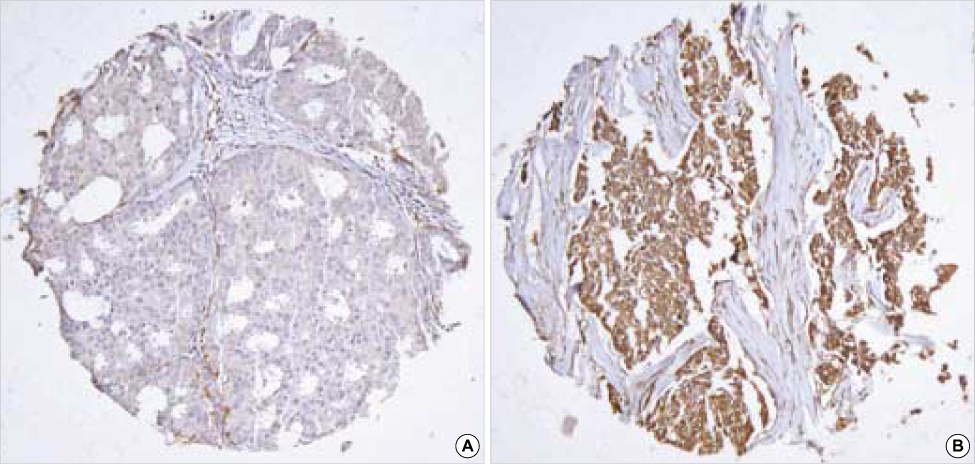J Breast Cancer.
2007 Jun;10(2):114-119. 10.4048/jbc.2007.10.2.114.
The gamma-Synuclein Expression in Breast Cancer and its Correlation with the Expression of the HER-2/neu Gene
- Affiliations
-
- 1Department of Surgery, Hallym University College of Medicine, Seoul, Korea. hhh@hallym.or.kr
- 2Department of Pathology, Hallym University College of Medicine, Seoul, Korea.
- KMID: 1745051
- DOI: http://doi.org/10.4048/jbc.2007.10.2.114
Abstract
-
PURPOSE: Synuclein has been identified as an important neuroprotein for developing pathologic deposits in Alzheimer's and Parkinson's disease patients. gamma-synuclein is also known as a breast cancer-specific gene 1 thats's not found in normal breast tissues but it has been reported to be overexpressed in breast cancer, ovarian cancer and other tumors. To evaluate the availability of gamma-synuclein expression as a prognostic factor for infiltrative breast cancer, we analyzed its correlation with the clinical parameters and the HER-2/neu gene expression.
METHODS
Two hundred fiffty samples of breast cancer tissues embedded in paraffin and that were obtained from the infiltrative breast cancer patients who were operated in our institution from January 1995 to December 2000 were analyzed with employing the tissue microarray technique. The expression of gamma-synuclein was studied with immunohistochemistry and with using gamma-synulcein antibodies. One hundred thirty one cases that showed favorable staining were selected and studied retrospectively.
RESULTS
Fiffty five% (71/131) of the patients showed gamma-synuclein overexpression. The histopathological findings that significantly correlated with gamma-synuclein overexpression were the number of metastatic lymph nodes (p<0.01) and the cancer stage (p<0.01). Using the same tissue mircoarray, the HER-2/neu gene expression and gamma-synuclein expression also showed statistically significant correlation (p=0.04).
CONCLUSION
gamma-synuclein overexpression showed significant correaltion with lymph node metastasis and cancer stage. It also showed significant relevance with the HER-2/neu gene expression, and that is already known to be a prognostic factor for breast cancer. Therefore gamma-synuclein may be a useful prognostic factor for infiltrative breast cancer and further studies on the its correlation with survival, local recurrence, and distant metastasis should be conducted
MeSH Terms
Figure
Reference
-
1. Lavedan C. The synuclein family. Genome Res. 1998. 8:871–880.
Article2. George JM. The synucleins. Genome Biol. 2002. 3:REVIEWS3002.3. Lavedan C, Leroy E, Dehejia A, Buchholtz S, Dutra A, Nussbaum RL, et al. Identification, localization and characterization of the human γ-synuclein gene. Hum Genet. 1998. 103:106–112.
Article4. Takeda A, Mallory M, Sundsmo M, Honer W, Hansen L, Masliah E. Abnormal accumulation of NACP/γ-synuclein in neurodegenerative disorders. Am J Pathol. 1998. 152:367–372.5. Ji H, Liu YE, Jia T, Wang M, Liu J, Joseph BK, et al. Identification of a breast cancer-specific gene, SNCG, by direct differential complementary DNA sequencing. Cancer Res. 1997. 57:759–764.6. Clayton DF, George JM. The synucleins: a family of proteins involved in synaptic function, plasticity, neurodegeneration and disease. Trends Neurosci. 1998. 21:249–254.
Article7. Ninkina N, Alimova-Kost M, Paterson J, Delaney L, Cohen B, Imreh S, et al. Organisation, expression and polymorphism of the human persyn gene. Hum Mol Genet. 1998. 7:1417–1424.8. Wu K, Weng Z, Tao Q, Lin G, Wu X, Qian H, et al. Stage-specific expression of breast cancer-specific gene gamma-synuclein. Cancer Epidemiol Biomarkers Prev. 2003. 12:920–925.9. Bruening W, Giasson BI, Klein-Szanto AJ, Lee VM, Trojanowski JQ, Godwin AK. Synucleins are expressed in the majority of breast and ovarian carcinomas and in preneoplastic lesions of the ovary. Cancer. 2000. 88:2154–2163.
Article10. Liu H, Liu W, Wu Y, Zhou Y, Xue R, Luo C, et al. Loss of epigenetic control of synuclein-gamma gene as a molecular indicator of metastasis in a wide range of human cancers. Cancer Res. 2005. 65:7635–7643.
Article11. Gupta A, Godwin AK, Vanderveer L, Lu A, Liu J. Hypomethylation of the synuclein gamma gene CpG island promotes its aberrant expression in breast carcinoma and ovarian carcinoma. Cancer Res. 2003. 63:664–673.12. Jiang Y, Liu YE, Goldberg ID, Shi YE. Gamma synuclein, a novel heat-shock protein-associated haperone, stimulates ligand-dependent estrogen receptor alpha signaling and mammary tumorigenesis. Cancer Res. 2004. 64:4539–4546.
Article13. Pan ZZ, Bruening W, Giasson BI, Lee VM, Godwin AK. γ-synuclein promotes cancer cell survival and inhibits stress- and chemotherapeutic drug-induced apoptosis by modulating MAPK athways. J Biol Chem. 2002. 277:35050–35060.
Article14. Borg A, Tandon AK, Sigurdsson H, Clark GM, Fernö M, Fuqua SA, et al. HER-2/neu amplification predicts poor survival in node-positive breast cancer. Cancer Res. 1990. 50:4332–4337.15. Winstanley J, Cooke T, Murray GD, Platt-Higgins A, George WD, Holt S, et al. The long term prognostic significance of c-erb-2 in primary breast cancer. Br J Cancer. 1991. 63:447–450.
Article16. Paterson MC, Dietrich KD, Danyluk J, Dono K, Kanai T, Mori Tl. Correlation between c-erb-2 amplification and risk of recurrent disease in node-negative breast cancer. Cancer Res. 1991. 51:566–567.17. Nichols DW, Wolff DJ, Self S, Metcalf JS, Jacobs D, Kneuper-Hall R, et al. A testing lgorithm for determination of HER2 status in patients with breast cancer. Ann Clin Lab Sci. 2002. 32:3–11.18. Wang S, Saboorian MH, Frenkel E, Hynan L, Gokaslan ST, Ashfaq R. Laboratory assessment of the status of Her-2/neu protein and oncogene in breast cancer specimens: comparison of immunohistochemistry assay with fluorescence in situ hybridisation assays. J Clin Pathol. 2000. 53:374–381.
Article19. Ross JS, Fletcher JA, Linette GP, Stec J, Clark E, Ayers M, et al. The Her-2/neu gene and protein in breast cancer 2003: biomarker and target of therapy. Oncologist. 2003. 8:307–325.
Article20. McKeage K, Perry CM. Trastuzumab: a review of its use in the treatment of metastatic breast cancer overexpressing HER2. Drugs. 2002. 62:209–243.
- Full Text Links
- Actions
-
Cited
- CITED
-
- Close
- Share
- Similar articles
-
- Value of Phospholipase C gamma-1, Epidermal Growth Factor Receptor, and Her-2/neu in Human Breast Cancer
- Numerical aberrations of chromosome 17 and her2/neu gene amplification, her2/neu and p 53 protein expression in breast cancer
- An Expression of HER-2/neu Oncoprotein in Endometrial Cancer
- Correlation of the Immunohistochemical Coexpression of p53 and HER-2/neu and the Prognosis of Breast Cancer
- The Analysis of HER-2/neu Gene Status and Correlation with Other Clinico-Pathologic Factors for Breast Cancer Using Tissue Microarray


